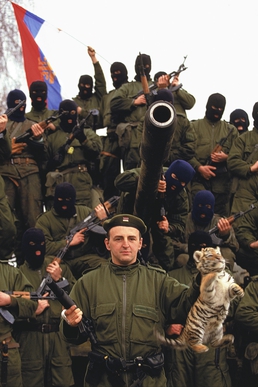
Željko Ražnatović, better known as Arkan, was a Serbian warlord, mobster and head of the Serb paramilitary force called the Serb Volunteer Guard during the Yugoslav Wars, considered one of the most feared and effective paramilitary forces during the wars. His paramilitary unit was responsible for numerous crimes in Eastern Bosnia, including murder, pillaging, rape and ethnic cleansings. He was one of the most celebrated and iconic figures in Serbia during his time.

The Serb Volunteer Guard was a Serbian volunteer paramilitary unit, founded and led by Željko Ražnatović. It fought in the Croatian War and the Bosnian War during the Yugoslav Wars, and was responsible for numerous war crimes and massacres.

Unit for Special Operations or Special Operations Unit, also known as Red Berets or Frankies, was an elite special forces police unit of Serbian State Security Directorate (RDB).
Aleksandar "Kristijan" Golubović is a Serbian media personality and criminal.

Svetlana Ražnatović, better known as Ceca, is a Serbian singer. Born in Prokuplje and raised in Žitorađa, she made her recording debut in 1988 and has collectively released sixteen studio albums.
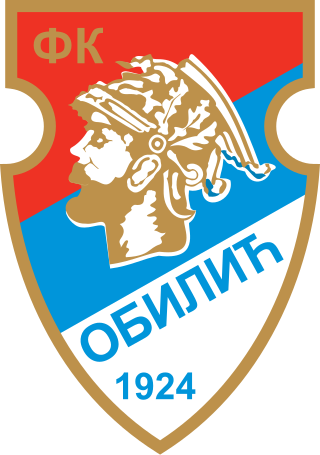
Fudbalski klub Obilić is a Serbian football club based in Vračar, a neighbourhood of Belgrade. It was named after medieval Serbian hero Miloš Obilić, a legendary 14th-century knight.
The Serbian mafia, or Serbian organized crime, are various criminal organizations based in Serbia or composed of ethnic Serbs in the former Yugoslavia and Serbian diaspora. The organizations are primarily involved in smuggling, arms trafficking, drug trafficking, human trafficking, assassinations, heists, assault, protection rackets, murder, money laundering and illegal gambling. Ethnic Serb organized crime groups are organized horizontally; higher-ranked members are not necessarily coordinated by any leader. According to criminologists and law enforcement authorities, the Serbian mafia is the most powerful in Europe.

Dragan Pantelić was a Yugoslav professional footballer who played as a goalkeeper. He scored over 20 goals over the course of his career, mainly from penalties.
The 1998–99 First League of FR Yugoslavia was the seventh season of the FR Yugoslavia's top-level football league since its establishment. It was contested by 18 teams, and Partizan won the championship.
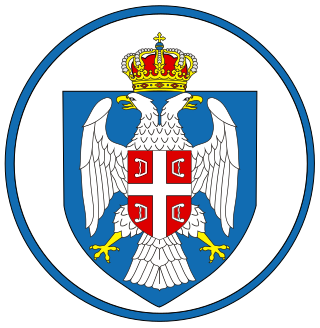
The White Eagles, also known as the Avengers, were a Serbian paramilitary group associated with the Serbian National Renewal (SNO) and the Serbian Radical Party (SRS). The White Eagles fought in Croatia and Bosnia and Herzegovina during the Yugoslav Wars.
Ljubomir Magaš was a Serbian amateur boxer, streetfighter and gangster. He was commonly known by his nickname Ljuba Zemunac.
Ratko "Cobra" Đokić was a Montenegrin-Swedish mob boss, a leader of the so-called "Yugo Mafia" or Yugoslavian Brotherhood, composed of Yugoslavs in Sweden. He owned a boxing gym in a suburb of Stockholm. He was assassinated in May 2003.
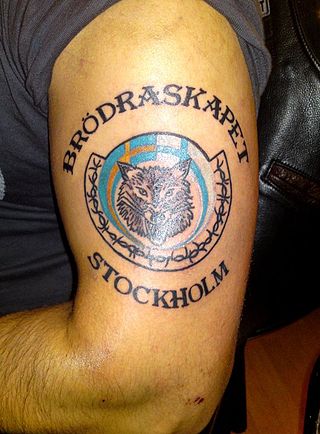
Brödraskapet, shortend BSK, is a Swedish prison gang that was founded on May 27, 1995 by inmates inside the maximum security prison in Kumla, Sweden. The police in Sweden consider The Brotherhood to be a criminal organization in regard to the EU criteria for organized crime.
Original Gangsters (OGs) is a criminal gang in Sweden. Founded in 1993, it has its base in Gothenburg and members in Halmstad and Jönköping, among other places, and is one of a handful of Swedish criminal gangs that have received significant media attention. Its leader and founder is Denho Acar, who fled Sweden in 2007. The current number of members is uncertain: Original Gangsters' own figures of some one hundred active were disputed by the Swedish police, which describe the gang as currently being largely decimated.

Per Michael "Joe" Ljunggren was a Swedish outlaw biker and gangster who served as the first national president of the Bandidos Motorcycle Club in Sweden. Ljunggren was a central figure in the Nordic Biker War, in which the Bandidos feuded with the Hells Angels. He was shot dead while riding his motorcycle on the E4 motorway in Småland. The murder remains unsolved, but police believe members of the Hells Angels to be responsible.
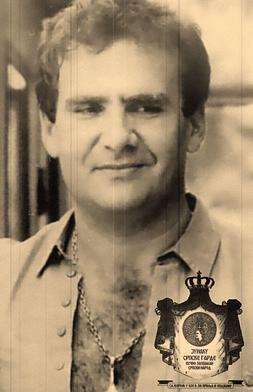
Đorđe "Giška" Božović was a Serbian criminal and paramilitary commander during the Yugoslav Wars.
Dragan "Jokso" Joksović, was a Swedish-Montenegrin mobster. The police believed that Joksović could be called the Stockholm "gangster king", being largely suspected of controlling cigarette smuggling into Sweden and Denmark. Brought to court many times, he wasn't able to be convicted of any offense other than minor drug offenses, assault and abuse of judicial procedure. He was murdered at the Solvalla Horse Racing Track in Stockholm on 4 February 1998 by Finnish hitman Janne Raninen. His nose was broken, and he was shot to death at three meters' distance. Janne surrendered himself to two security guards working in the restaurant where the shooting took place. Although Raninen claims to have shot four shots, two staff at the betting booth where Joksović, was murdered in front of were also hit by bullets from the shooting, suggesting more shots were fired. Both staff members were taken to a hospital; one had been penetrated in the arm by a bullet and the other had been grazed by a bullet. A bystander in the queue at the betting booth was also hit in the shoulder by a bullet.
Rade Rakonjac was the bodyguard of Serbian war criminal Željko Ražnatović, close friend of the Zemun Clan mafia boss Luka Bojović, and a colonel in the Serbian Volunteer Guard. He was murdered in 2014.

X-Team is a gang associated with the Bandidos Motorcycle Club. Members are not required to own a motorcycle, and the group is essentially a street gang recruiting young criminals to provide reinforcements for the club. X-Team members carry out crimes on behalf of the Bandidos, such as debt collection and drug dealing, which allows the club to distance itself from violence and crime.










